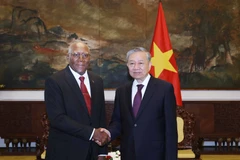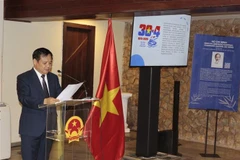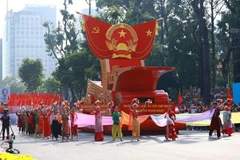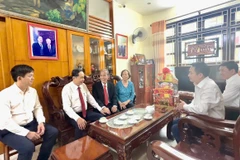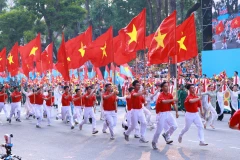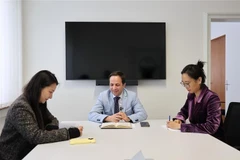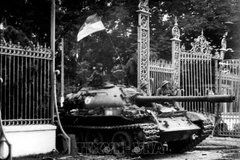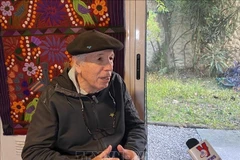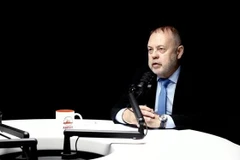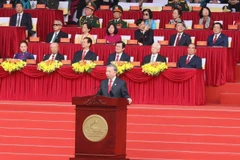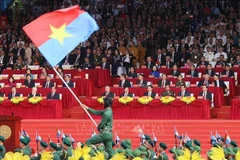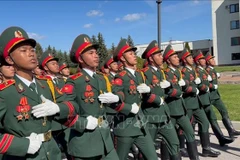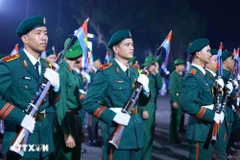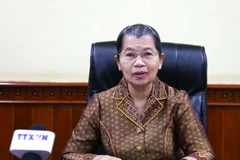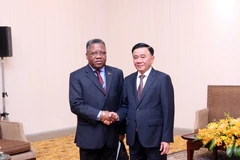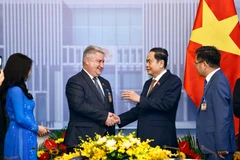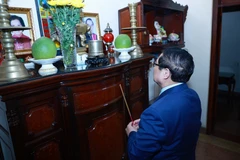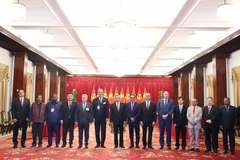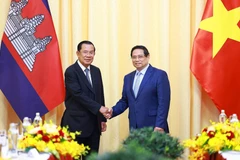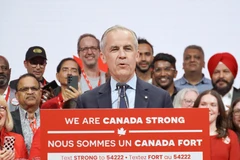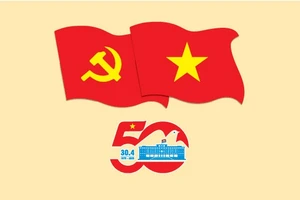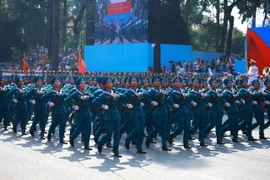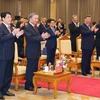At the 4 th ASEAN-UN Summit, theASEAN leaders and UN Secretary-General Ban Ki-moon reviewed theimplementation of the decisions of the previous summit, which took placein Hanoi in October 2010.
The ASEAN leaders spoke highly ofthe support of the UN and its agencies for ASEAN in building theCommunity, realising the Millennium Development Goals (MDGs),strengthening regional connectivity, narrowing the development gaps andboosting the development of subregions, especially the Mekong Subregion,improving the capacity to cope with climate change and naturaldisasters, reduce poverty and prevent diseases as well as boosting thereasonable and sustainable exploitation and use of water resources.
UN Secretary General Ban Ki-moon highly valued ASEAN countries’achievements in implementing the MDGs as well as the bloc’s importantrole and active contributions to peace, cooperation and development inthe region.
Speaking at the event, PM Dung spokehighly of strong developments in the ASEAN-UN cooperation since the 3 rdSummit in Hanoi last year.
He affirmedsupport for the adoption of the Joint Declaration on ComprehensivePartnership between ASEAN and the UN, and suggested the UN continue toassist ASEAN in its efforts to fulfil the MDGs by 2015 and implement theMaster Plan on ASEAN Connectivity, the Initiative for ASEAN Integration(IAI), the Joint Declaration on ASEAN-UN Cooperation in DisasterManagement and the Strategic Action Plan on Disaster Management in the2011-2015 period.
At the end of the summit, thetwo sides issued the Joint Declaration on ASEAN-UN ComprehensivePartnership with a view to expanding and deepening bilateral cooperationin various fields.
On political-securitycooperation, the two sides agreed to strengthen and improve theefficiency of cooperation in building the ASEAN Community andimplementing the Master Plan on ASEAN Connectivity; ensure peace andsecurity in Southeast Asia and other regions; and promote democracyand human rights and expand dialogues on regional and internationalissues of common concern.
On economiccooperation, the joint declaration said that through agencies,foundations and programmes, the two sides will boost cooperation ineffectively implementing the Master Plan on ASEAN Connectivity and theInitiative for ASEAN Integration.
The two sideswill focus on raising ASEAN’s capacity in responding tofinancial-economic crises and improving the member economies’ dynamismand sustainable growth. They will step up cooperation in addressingenergy and food security issues in combination with the effectivemanagement of natural resources.
They also agreedto speed up the implementation of the MDGs in ASEAN with the closecollaboration of the UN and developed countries.
On socio-cultural cooperation, the two sides agreed to expandcooperation in community building and human development, and promotehuman health, culture and social welfares. They will join hands indealing with global climate change and managing natural disasters.
At the ASEAN-India Summit, ASEAN and Indian leaders appreciated theresults of the implementation of the 2011-2015 Plan of Action, the2011-2012 Working Programme, and the Goods Trading Agreement between thetwo sides.
The two sides agreed to build contentsfor upgrading their relations to a strategic partnership, speed up thenegotiation for an agreement on service trading and investment, andboost cooperation in science and technology, agriculture, andpharmaceuticals as well as in non-traditional security issues such asdisaster prevention, climate change, maritime security and transnationalcrimes.
ASEAN countries value India ’s “LookEast” policy and the country’s support for ASEAN in building theCommunity, strengthening connectivity, and improving its central role inthe region.
The two sides agreed to jointlyorganise activities marking the 20 th anniversary of the ASEAN-Indiadialogue relations in 2012.
Speaking at thesummit, PM Dung suggested the two sides strengthen trade and investmentties and strive to complete a free trade area by 2012.
ASEAN and Indian should boost connectivity in transport, informationtechnology and energy as well as promote people-to-people exchanges andcooperation in science and technology, he stated.
The Vietnamese government hailed valued India ’s initiative onsetting up the ASEAN-India Network on Climate Change and applauded thelaunch of the ASEAN-India Green Fund to back cooperation projects inthis field.
He suggested the two sides early buildcontents for their strategic partnership and organise activitiescelebrating the 20 th anniversary of ASEAN-India dialogue relations,including the organisation of the ASEAN-India Commemorative Summit inNew Delhi in 2012.
At the 6 th East AsianSummit, the EAS countries welcomed the participation for the first timeof the US and Russia . They agreed that in the new context, EAScontinues to be a forum for the leaders to exchange opinions on issuesof strategic importance relating to peace, security and development inthe region, including maritime safety, response to natural disasters andprevention of pirates and transnational crimes.
The leaders saidthat EAS should continue boosting cooperation in defined areas ofpriority such as finance-economics, energy, and natural disasters aswell as supporting the implementation of ASEAN connectivity, thusstrengthening and expanding connections in the whole region.
They affirmed that EAS will continue to be an important component ofthe evolving regional architecture with ASEAN playing the central role.They emphasised the need to strengthen coordination and mutual supportamong existing regional mechanisms, including the EAS, ASEAN+3, theASEAN Defence Ministerial Meeting Plus (ADMM+) and the ASEAN RegionalForum (ARF), effectively contributing to regional peace, stability anddevelopment.
The leaders stressed that the EASshould make active contributions to consolidating and strengthening anenvironment of peace, stability and development cooperation in theregion, including maritime security and safety, on the basis ofrespecting international laws, the UN Convention on the Law of the Sea(UNCLOS), fully implementing the Declaration on Conduct of Parties inthe East Sea (DOC) towards a Code of Conduct in the East Sea (COC).
Speaking at the event, PM Dung said that the EAS has developeddynamically and become an important and indispensable part in the EastAsian cooperation and structure.
As peace,stability, security and development are common objectives and interestsof all regional countries, the EAS should further promote its role inbuilding standards and codes of conduct in the region besides bringinginto full play existing tools, firstly the EAS Declaration on thePrinciples for Mutually Beneficial Relations to be adopted at thissummit, he said.
Dung stressed that ASEAN and EAScountries need to strengthen cooperation for peace, stability, maritimesecurity and safety in East Asia , and solve disputes through peacefulsolutions on the basis of international laws, especially the UNCLOS.
Vietnam welcomed ASEAN and China strengthening dialogues,mutual trust and understanding to speed up the implementation of the DOCtowards the COC, the PM said.
At the end of the summit, the leaders adopted the EAS Declarations on the Principles for Mutually Beneficial Relations and ASEAN Connectivity./.
